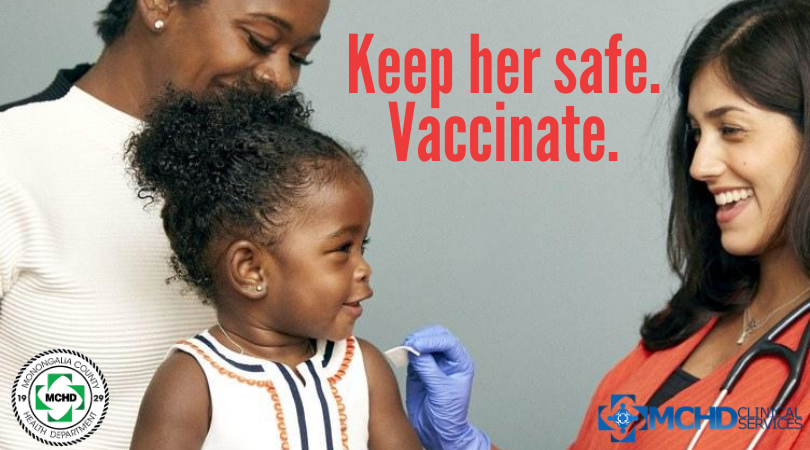Don't let COVID-19 keep your child from getting routine vaccinations

Aug. 12, 2020
By Mary Wade Burnside
Recently, the World Health Organization has expressed concern that the COVID-19 pandemic is keeping parents from taking their children to their health care provider for routine vaccinations.
This means that around the world, 80 million babies are at high risk for diseases such as diphtheria, measles and polio. It was also noted that this has been the largest disruption in vaccination campaigns since they began in the 1970s.
At around the same time, the Centers for Disease Control and Prevention has noted a decrease in orders from the Vaccines for Children vaccines recommended by the CDC’s Advisory Committee on Immunization Practices.
After closing to all visits but emergencies for about two months at the start of the pandemic, Monongalia County Health Department’s Clinical Services program is back open and providing back-to-school vaccines.
Because August is National Immunization Awareness Month, it’s a good time to highlight that everyone still needs to get the vaccines they need so they can avoid coming down with preventable illnesses.
That’s always the goal and it’s definitely a good one during a pandemic.
This blog will focus on vaccines that babies and young children need. These days, parents have an arsenal to help them combat 14 harmful and potentially deadly diseases that their kids can be exposed to before their children hit the terrible twos.
Most parents agree that inoculating their offspring against diseases such as measles, chickenpox and whooping cough is the right thing to do. In numbers available last year, before the pandemic, the CDC reported that nine out of 10 people have their children vaccinated according to an immunization schedule or intend to do so.
A year ago, a measles outbreak in the United States was the illness making big news. Luckily, because of West Virginia’s strict vaccination laws, none of those cases were diagnosed in West Virginia. The outbreak did illustrate that people can become complacent when they forget how commonplace diseases such as the measles were before the widespread availability of vaccines. Many of them also never saw complications associated with illnesses such as measles.
Measles is highly contagious and can be dangerous, especially for babies and young children. According to the CDC, one out of four people who get measles will be hospitalized, one out of every 1,000 who get measles will develop brain swelling due to an infection called encephalitis — which may lead to brain damage — and one or two out of 1,000 people with measles will die, even with the best care.
The MMR vaccine — when administered according to the CDC’s immunization schedule — provides children with protection from measles, mumps and rubella.
Then there is pertussis, also known as whooping cough, which can cause serious and sometimes deadly complications for babies and young children, especially those who are not fully vaccinated. Complications include:
• 1 out of 2 babies younger than the age of 1 will need hospital care
• 1 out of 4 will get pneumonia
• 1 out of 100 will experience convulsions
• 3 out of 5 will have apnea, or slowed or stopped breathing
• 1 out of 300 will have encephalopathy, or disease of the brain
• 1 out of 100 will die
The DTaP vaccine, administered at 2 months, 4 months, 6 months, 15 through 18 months and through the ages of 4 and 6, not only protects against whooping cough, but also diphtheria and tetanus. If a child falls behind schedule, he or she can get the Tdap vaccine after the age of 6.
These are just some of the common childhood illnesses that vaccines can prevent or make symptoms less severe. Vaccines are the safest and most effective way to protect children from these diseases. Parents can provide the best protection by following the recommended immunization schedule, giving children the vaccines they need when they need them.
It might seem overwhelming, but the CDC has prepared a graph and chart detailing the 14 diseases prevented by vaccines before the age of 2 in an easy-to-read format. And all vaccines used in the United States require extensive safety testing before they are licensed by the U.S. Food and Drug Administration (FDA).
For more information on vaccines, contact your health care provider. To make an appointment for vaccines, call MCHD Clinical Services at 304-598-5119.
Because of the pandemic, MCHD Clinical Services has a series of safeguards in place to protect patients, including filling out forms in advance, calling from your car when you arrive, taking temperatures and escorting patients directly to the exam room.
Mary Wade Burnside is the public information officer at Monongalia County Health Department.